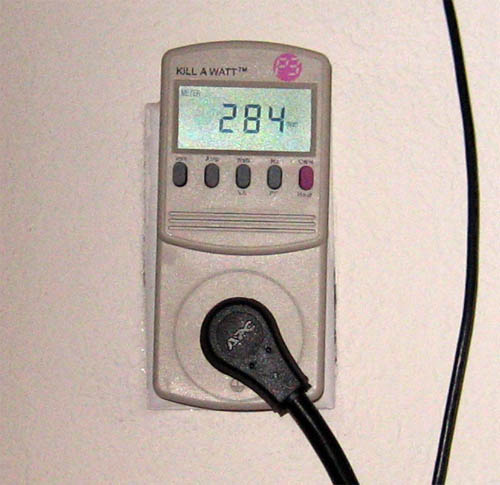Kill A Watt
I recently got a Kill A Watt, which is a device that plugs in between the wall and your electronic devices. It monitors various parameters, such as volts, amps, watts, and kilowatt-hours.

Kill A Watt power meter
It's very interesting to see how much power all of my devices are using. Without knowing these kind of details, it's difficult to accurately answer certain kinds of questions about my power usage. For example: "Is it worse to leave my computer turned on, or leave two lights on?" (answer: the computer is worse if the lights are CFLs, but not if they're incandescent) Or, "Should I turn off my computer speakers when I am gone, even if no music is playing?" (answer: probably)
Here are some measurements I just made:
- Computer, idle: 130 watts
- Computer, 1 core active: 170 watts (2 cores: 195 watts)
- LCD monitor, minimum brightness: 50 watts
- LCD monitor, maximum brightness: 110 watts
- Computer speakers: 8 watts (always)
There were several surprises just from measuring these three devices - I didn't expect to see such a wide range of power consumption even on one device. I will often absent-mindedly leave open web browser windows that contain Flash animations (such as the YouTube video player's animations after a video finishes playing). Little did I know, a few of these pages could end up using as much power as leaving on a 60 watt light bulb!
Another surprise was that my speakers always seem to be using 8 watts of power, whether they are playing sound or not. Previously I had assumed that they weren't using any power when they were silent, so I have been leaving them on all the time. Doing that for the past 4 years has apparently cost me $25 (8 watts x 4 years = 280 kWh).
That last number brings up an interesting point - I was surprised at how low the dollar number was when I calculated it. I currently live in the Northwest US, and our power is relatively cheap since a lot of it is provided by hydroelectric dams. I am currently paying about 9 cents per kilowatt-hour. If I were to move to California I'd need to be a little more careful about turning things off, since they pay about twice as much down there.





